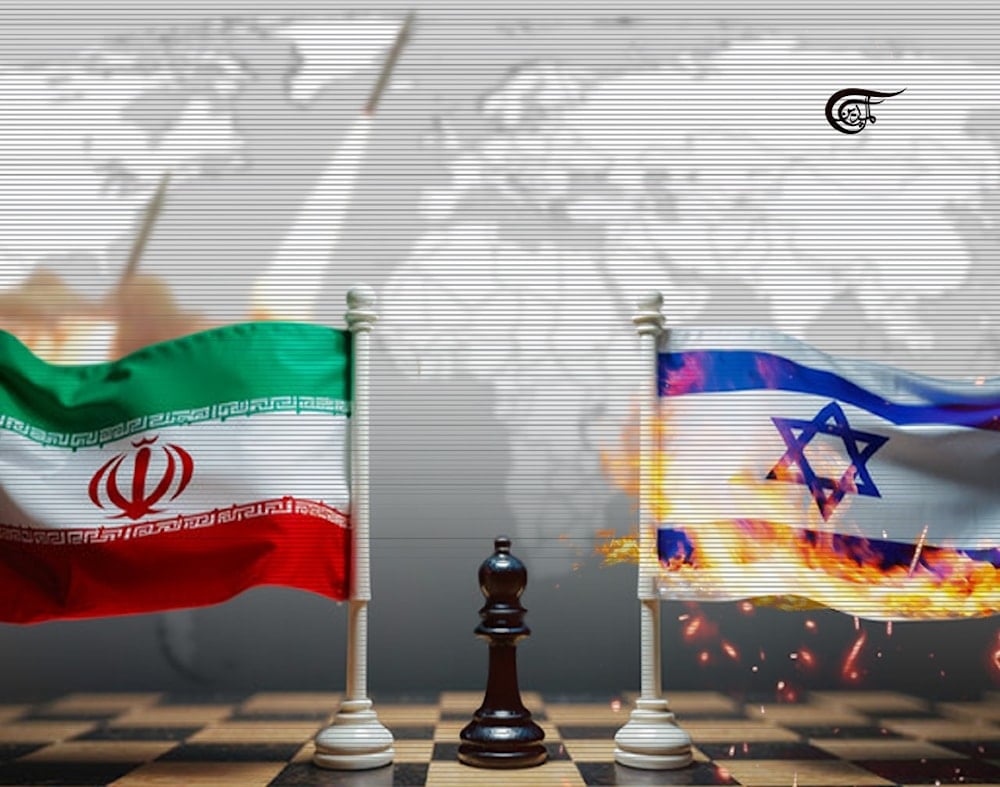'Israel' burns its deck while Iran plays its cards right
"Israel's" calculated but desperate escalation, Iran’s strategic patience and powerful retaliation, and the shifting balance of control in the region.
-

From bluff to blowback: How Iran seized the initiative after "Israel’s" long-planned strike backfired
“Israel” delivered on its years-long threat to bomb Iran and hit its nuclear sites shortly after Tehran disclosed massive possession of leaks showing detailed information on Israeli nuclear sites, dislodging “Israel’s” perception of supreme intelligence superiority. Iran, however, has prepared for this point. In the eyes of the Zionist entity, the crosshairs have shifted from Gaza to Iran. While "Israel" claims its strength in its measured, calculated steps, the Resistance maintains the control and pacing of escalations, allowing “Israel” to burn its cards and pulling itself out of its initial shock-and-awe. On the fourth day of Zionist-provoked war, Iran has waged its strongest night of retaliatory attacks yet, consistently scaling up the pace and intensity of escalation.
Meanwhile, the US is acting out of desperation in using its war as a brinksmanship tactic to extract concessions, primarily focused on ending Iran’s nuclear capabilities, along with its technological development and defense.
The promise of negotiations, dangling the carrot of sanctions relief and in front of the comparatively more reformist administration, came with the stick that was the US and "Israel’s" real plan: to bait Iran into letting its guard down.
At the beginning of the Zionist entity’s siege on Lebanon in September 2024, “Israel” built upon the treacherous strategy of false promises and empty gestures for negotiations, the same strategy used prior to last September 27th’s martyrdom of Sayyed Hassan Nasrallah.
The next plan, after the all-out war on Lebanon, was to turn the crosshairs on Iran, having activated Takfiri elements to destroy Syria. This was aimed at clearing the airspace for the Zionist entity to eventually strike Iran, aiming at nuclear facilities as a longstanding card to play in its deck.
For a while, it worked. In the meantime, Iran stayed exceptionally patient – some might say to a fault – as red lines were repeatedly crossed.
The Times of Israel spoke of the extent of “behind-the-scenes cooperation” between the United States and "Israel” shortly after both the outlet and The Jerusalem Post gloated on their "joint deception".
“Israel’s” choice of covert operations is designed to keep the US’ cover while protecting Washington’s dwindling resources, exhausted after a year and a half of incessant aggression in the region and running thin and worn out from the regional Resistance’s war of attrition. The US also seeks to continue to bet on continued negotiations with Iran and force a position of strength that both the Zionist entity and Washington lost to the Resistance and Iran. At the negotiating table, aside from its inherent role as a farce and folly, Trump’s “60 day ultimatum” was designed to force concessions that could not be won against the Resistance factions on the ground and to force Iran into abandoning its defenses.
"Israel’s" attempts to pressure the Resistance in Yemen with bombings or the Gaza Resistance with terrorist attacks have come to no avail. It has failed in deterring the Ansar Allah from carrying out operations, which have expanded beyond sea into air, paralyzing the entity’s airports and economy, and failed to infiltrate and crush the Resistance in Gaza. During Trump’s 60-day ultimatum period, the US and “Israel” both failed to deter the Resistance or pressure Iran into stopping their control over the pace of escalations, undertaken during the entity’s siege on humanitarian aid and acceleration of its starvation campaign against Gazan civilians.
As “Israel” and the US struggled and crumbled under their own crisis in leadership, the Resistance and Iran held firm to their control over escalation, red lines, and decision-making. By greenlighting Israeli attacks, the Trump administration, trying to mediate its inclination toward "America First" with the demands of the Trump empire’s minions, tries to toe the line between a more hands-off approach with projecting dominance. For Trump and his administration to arrogantly assume “Israel’s” strikes will lead to Iran begging for more concessions is not just a miscalculation but a projection, as the US administration itself is more desperate to ensure its upper hand, swiftly rebuffed and rejected by Iran.
Yet the US, EU, and UK pursued similar rhetoric: The empty condemnations, the half-hearted halt to weapons intended to bluff Iran and also not end up in its target bank, as the same forces within Europe and the collective West geared up to help "Israel" in its attack. Weaponizing the negotiations in their own right, these European capitals, particularly France, led the attempt to neutralize Gaza of Hamas and its Resistance in exchange for the supposed "recognition of a Palestinian state."
Many continued to operate with the delusion of the institutional reality of negotiating spaces and the "international community's" real plan behind them. The Iranian Leader has exhausted himself warning against negotiating with the US, directly or indirectly, as it's not just a dead end but a deadly one. “Israel’s” June 13 attack finally put a nail in the coffin of all those delusions.
Iran’s retaliatory strikes on the night of June 13 were not merely symbolic, but central in inflicting serious material, physical damage on the enemy while showcasing new ranges of capabilities, such as the Kheybar Shakan ballistic missiles and Hajj Qassem missiles. “Israel’s” main targets involved crippling Iran’s air defense capabilities, a target of its initial sabotage, though Iran’s downing of 4 US F-35s marks a huge blow to the entire Western world’s air power, dependent on the US’ indespensible air artillery and weapons.
Iran demonstrated its ability to surpass all US-Israeli air defense systems, such as the THAAD. Iran, and, likely, Resistant forces in Iraq, kept the entity’s air defenses busy initially as they made way for ballistic missiles to cut through 5 layers of defense to drive, uninterrupted, right into their targets. This is without Iran having touched its advanced and strategic weapons.
“Israel” has clearly acted not out of strength, but out of desperation. The Zionist entity’s strike on Iran, 20 years in the making, is Netanyahu’s "last viable deterrent," as The Jerusalem Post wrote on the day of the Israeli attacks on Iran. As Iran turns in on its 5th day of battle, it is hitting critical sites and infrastructure from Zionist entity war industry research centers, such as the Weizmann Institute, hit by Iran the night of June 15, energy infrastructure, and oil depots. In this regard, Iran is bringing justice to not only attacks on it from the Zionist entity, but is retaliating in kind for all the attacks made on both Iran’s research facilities, energy sites, and oil depots, as well as those made on Syria, Yemen, Lebanon, and across the region.
Meanwhile, Iran has smartly employed the use of decoys in bluffing and redirecting “Israel’s” attacks, such as missile launchers that are likely fake, with military analysts pointing out the lack of secondary explosions upon impact. This mirrors a strategy used by Hezbollah to, like Iran, hide and move critical equipment to hidden points in the mountains while leaving decoys exposed.
“Israel’s” longtime hesitation in attacking Iran comes from its understanding that it can’t invade or destroy Iran from the outside and can only hope to incite regime change from within. With all “Israel” and the collective West’s failure in securing a credible and strong opposition prior to this point becomes even smaller as Iranians, from all different political dispositions, came unified amid the Israeli attacks.
What separates “Israel” from its opponents in the axis is not just money or capabilities but rather ethics and morals. Covert tactics of sneaking bombs into vehicles – Operation Spiderweb style – are moves of treachery, weakness, and cowardice, not skill or prowess. The vast majority of “Israel’s” operations against Iran occurred via internal sabotage and treachery, which is giving the leadership a chance to weed out agents, uncover Mossad-operated drone workshops, and identify spy networks. Since Iran’s operations to detain and eliminate Mossad-linked agents and makeshift drone-producing mini-labs has picked up, Iran’s air defenses have worked much more quickly and effectively, and interceptions have been much more successful.
Iran is not a besieged enclave; its land, sea, and air borders are not controlled by the entity. Unlike Lebanon or Iraq, it retains full territorial and decision-making sovereignty. While it doesn’t have nuclear weapons, nor the whole Western world’s resources at its disposal, it is commanded by the Iranian Leader and his wise guidance of truth, as well as his institutional knowledge, deep insight, and ethics.
By inciting regime change and assassinating leaders, “Israel” has spent the last 20 months trying to force a situation of "crisis in leadership" on the Resistance, yet is only exposing its own illegitimacy and crisis in leadership.
The settlers, in stark contrast to the Iranian people, are plunged into anxiety, panic and hopeless distress upon coming to the same realization as their government – that they no longer enjoy immunity, security, and prosperity, lounging on beaches or partying in night clubs, hedonistically living off the fruits of occupation, expropriation, and oppression. As an Iranian commander disclosed to Iranian state media’s Tasnim News yesterday, official analyses even confirmed a 50% rise in "fear among the Zionists." The Iranian people, in contrast, are putting their differences and internal contradictions aside and are coming together, from all political backgrounds and dispositions, in support of their nation.

 Julia Kassem
Julia Kassem
 9 Min Read
9 Min Read











